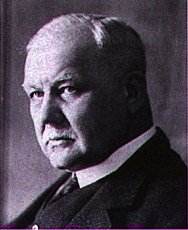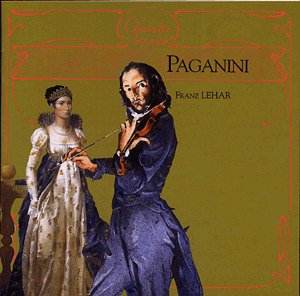
Paganini is of course an attempt to tell the romantic story
of this composer/violinist's life. This is one of the more substantial
and serious works of Lehár. Its book was a libretto by
Knepler, The Wizard, concerning the legends of Paganini's
affair with the Duchess of Lucca, Anna Elisa (Napoléon's
sister). Apparently Knepler's libretto was shown to Lehár
behind the author/publisher's back and Lehár so liked it
that he started composing before Knepler gave his permission.
However, when he heard it, Knepler so liked the music that he
allowed Lehár to continue with the material. Although in
it we get a hint of the light operetta style of writing yet to
come from Lehár, the score has unusual depth and complements
the subject matter well. It contains good melodies and songs were
frequently encored.
The work has been infrequently produced because of the need for a virtuoso violinist to appear on stage, but this is usually achieved by having the character playing off-stage in silhouette whilst a singer plays the same part on-stage.
The original production at the Johann Strauss Theater in Vienna was disappointing: Richard Tauber was unavailable (on tour) and singers, Clewing and Kosary were not strong enough to carry the parts; the orchestra was mediocre and its conductor didn't inspire. Encouraged by Tauber, it was decided to take the production to Berlin in 1926 where its opening night was a triumph with himself and Schwarz in the main roles. Here, these parts are taken by Massard and Riedinger, both of whom are strong in the recording and complement each other well in the duets 'Laisse-moi' and 'Dis moi' [CD1 tr.12 and CD2 tr.6]
The number 'J'ai toujours' sung by Paganini is one of the key numbers that is the nearest one gets to a resemblance to The Land of Smiles. It is well sung by Massard. I find that Roméo Carles as Pimpinelli adds little to the recording while Geori Boue does her best to partner him in the duets they sing together.
Henri Merckel's solos on the violin are excellent and add both sparkle and atmosphere. (I guess that he is leader of the studio orchestra used by Decca.) Pierre Dervaux handles the singers, choir and orchestra with panache and engages in some catchy rhythms and tender moments.
This recording was first released om mono LPs in the 1950s. The transfer is good but the woodwind are terribly recessed and so a certain amount of Lehárian decoration is lost. A nice balance is achieved with violin, flute and harp in Bella's 'Flûte magicienne', ably sung by Geori Boue, however. A considerable amount of treble to Massard's voice is evident on some tracks, making him sound somewhat 'thin'.
Brief notes in French are provided and a card case replaces the usual jewel case.
Raymond Walker
Operette
series from Universal Accord reviewed
by Ray Walker

